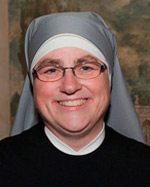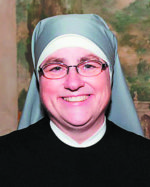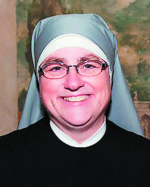
Sister Constance Veit
Little Sisters of the Poor
By Sister Constance Veit, l.s.p.
I began the new year with 8,000 college students at the Student Leadership Summit (SLS18) of the Fellowship of Catholic University Students (FOCUS). It was an inspiring event that enabled us Little Sisters to engage with hundreds of enthusiastic young people on fire for their Catholic faith.
As exciting as the whole event was, the most moving moment for me was completely unexpected. During Eucharistic adoration, Jesus Christ present in the monstrance started moving through the crowd, carried by a team of bishops and priests. An entourage of altar servers led the procession with candles and incense.
What caught my eye was one of the white robed altar servers walking backwards, swinging a thurible from which billowed sweetly scented smoke, his attention firmly fixed on Christ in the Eucharist. The only thing that kept him from stumbling into the crowd of young people was a second altar server who kept his hand firmly planted on the first man’s shoulder to direct his every move.
It was a highly choreographed and striking scene – this entourage of clergy and altar servers walking together in perfect unity, leading one another, supporting each other’s efforts to carry Christ! I was profoundly struck by this “holy teamwork,” which must have required significant practice and single-minded focus.
This Eucharistic procession was a fitting metaphor for the ideals of solidarity and union of hearts and minds in continuing our Lord’s mission on earth. Imagine the wonderful things we could do for Jesus if each Catholic apostolate, religious community or lay movement were this well ordered and united around a common purpose! In his encyclical on love, Pope Benedict XVI said, “As a community, the Church must practice love. Love thus needs to be organized if it is to be an ordered service to the community.”
As we head into Lent this month, we first celebrate the World Day of the Sick on Feb. 11. Just as the procession I witnessed at SLS18 kept Our Eucharistic Lord at the center as it moved through the crowd of young people – a veritable field hospital of souls – Catholic health care is called to place the human person at the center of all its activities, projects and goals.
In his message for this year’s World Day of the Sick Pope Francis wrote, “Wise organization and charity demand that the sick person be respected in his or her dignity, and constantly kept at the center of the therapeutic process.”
Our Holy Father continued, “Jesus bestowed upon the Church his healing power … The Church’s mission is a response to Jesus’ gift, for she knows that she must bring to the sick the Lord’s own gaze, full of tenderness and compassion. Health care ministry will always be a necessary and fundamental task, to be carried out with renewed enthusiasm by all, from parish communities to the largest healthcare institutions.”
Pope Francis recognized the invaluable contribution of families, “The care given within families is an extraordinary witness of love for the human person; it needs to be fittingly acknowledged and supported by suitable policies.”
He also speaks of healthcare as a shared ministry: “Doctors and nurses, priests, consecrated men and women, volunteers, families and all those who care for the sick, take part in this ecclesial mission. It is a shared responsibility that enriches the value of the daily service given by each.”
As we observe the World Day of the Sick and then begin our Lenten practices of prayer, penance and almsgiving, let’s resolve to keep Jesus Christ and the human person at the center of our spiritual efforts and works of mercy.
And let’s endeavor to give the world a striking witness of the unity of Christ’s disciples. May the world be able to say of us, “The believers are of one heart and mind … sharing everything they have” (cf. Acts 4:32). May our united efforts to serve the poor, the sick and the most vulnerable among us lead others to believe in the power of God’s love at work in the world!
(Sister Constance Veit is director of communications for the Little Sisters of the Poor.)

 Over Christmas, two of my family members were talking about a mutual friend who, though chronically ill, routinely does heroic acts of kindness for others. Though they get exasperated with her when she overextends herself, they realize that caring for others is what makes life meaningful. I thanked God that these women are kind enough to support their friend through both good times and bad, helping her to live a full life.
Over Christmas, two of my family members were talking about a mutual friend who, though chronically ill, routinely does heroic acts of kindness for others. Though they get exasperated with her when she overextends herself, they realize that caring for others is what makes life meaningful. I thanked God that these women are kind enough to support their friend through both good times and bad, helping her to live a full life.